Free E-Mail
Bible Studies
Beginning the Journey (for new Christians). en Español
Old Testament
Abraham
Jacob
Moses
Joshua
Gideon
David, Life of
Elijah
Psalms
Solomon
Songs of Ascent (Ps 120-135)
Isaiah
Advent/Messianic Scriptures
Daniel
Rebuild & Renew: Post-Exilic Books
Gospels
Christmas Incarnation
(Mt, Lk)
Sermon on the Mount
(Mt 5-7)
Mark
Luke's
Gospel
John's Gospel
7 Last Words of Christ
Parables
Jesus and the Kingdom
Resurrection
Apostle Peter
Acts
The Early Church
(Acts 1-12)
Apostle Paul
(Acts 12-28)
Paul's Epistles
Christ Powered Life (Rom 5-8)
1 Corinthians
2 Corinthians
Galatians
Ephesians
Vision for Church
(Eph)
Philippians
Colossians,
Philemon
1
& 2 Thessalonians
1 & 2 Timothy,
Titus
General Epistles
Hebrews
James
1 Peter
2 Peter, Jude
1, 2, and 3 John
Revelation
Revelation
Conquering Lamb of Revelation
Topical
Glorious Kingdom, The
Grace
Great Prayers
Holy Spirit, Disciple's Guide
Humility
Lamb of God
Listening for God's Voice
Lord's Supper
Names of God
Names of Jesus
Christian Art
About Us
Podcasts
Contact Us
Dr. Wilson's Books
Donations
Watercolors
Sitemap
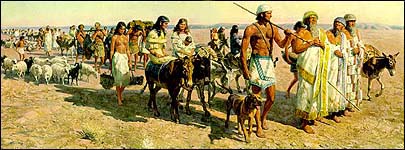 Abraham and Terah travelling from Ur to Haran, illustration for
Everyday Life in Bible Times (National Geographic Society, 1968), by
American illustrator Tom Lovell (1909-1997).
Abraham and Terah travelling from Ur to Haran, illustration for
Everyday Life in Bible Times (National Geographic Society, 1968), by
American illustrator Tom Lovell (1909-1997).
|
The account of Abraham's life seems to begin with a simple genealogy. But as you read the account you begin to see faith peeking out and making a difference.
Abraham's Family (11:27-30)
"This is the account of Terah. Terah became the father of Abram, Nahor and Haran. And Haran became the father of Lot. While his father Terah was still alive, Haran died in Ur of the Chaldeans, in the land of his birth. Abram and Nahor both married. The name of Abram's wife was Sarai, and the name of Nahor's wife was Milcah; she was the daughter of Haran, the father of both Milcah and Iscah. Now Sarai was barren; she had no children." (11:27-30)
Here's a family tree of Abraham's ancestors and descendents (Larger PDF chart.) https://www.jesuswalk.com/abraham/images/abe_genealogy.pdf
As you study this family tree you can see it isn't so simple after all. Notice several of the interesting relationships. First, Abraham has married his half-sister ("the daughter of my father though not of my mother," 20:12). Second, Abraham's brother Nahor married his niece, Milcah, the daughter of his deceased brother Haran. There is a provision for levirate marriage in the Mosaic law to protect a widow, where a brother dies without any children (Deuteronomy 25:5-10, for example, Ruth and Boaz). Here the relationship may be covered by wife-sister customs peculiar to Hurri society and regions that took over Hurrian practices.[1] A similar Hurrian custom may have enhanced the relationship between Abraham and Sarah (which we'll discuss in Lesson 2). Finally, Isaac marries his cousin Rebekah and Jacob marries his cousins Rachael and Leah. This marrying within the clan -- though later prohibited in the Mosaic Law (Leviticus 18) -- was not viewed as incestous within the culture. Rather it is an example of endogamy, marriage with a tribe or kinship unit, in order to maintain cultural and religous values and property rights.[2]
From Ur to Haran (11:31-32)
Now the account turns to a migration:
"Terah took his son Abram, his grandson Lot son of Haran, and his daughter-in-law Sarai, the wife of his son Abram, and together they set out from Ur of the Chaldeans to go to Canaan. But when they came to Haran, they settled there. Terah lived 205 years, and he died in Haran." (11:31-32)
As discussed in the Introduction, we're not sure whether Ur was in Lower Mesopotamia or northern Mesopotamia, not too far from Haran. No matter which location, Abraham's migration was in two phases: (1) from Ur to Haran and (2) from Haran to Canaan. According to Stephen's account in Acts 7:2-3, it was God's word to Abraham that had initiated the family's move.
They had set out for Canaan, "but when they came to Haran, they settled there." They stopped and settled. Why? We don't know for sure. Perhaps Terah was in ill health. Perhaps the grazing was too good in Haran to pass up. We're not sure. Abraham waited until Terah died, and then began the journey afresh.
|
Q1. (11:32) Have you ever begun something in response to God's urging and then stopped? Did God want you to stop? Is it time now to renew your obedience and begin again? (Don't take this question lightly. Sometimes circumstances prevent us from doing what we once felt God wanted us to do. However, he is able to redirect you into his will for you now. Seek him diligently to learn his will.)https://www.joyfulheart.com/forums/index.php?act=ST&f=52&t=224
|
The Call of Abraham (12:1-3)
Whether verse 1 is recording a renewed call ("said," NRSV) or a referring to the previous call in Ur ("had said," NIV, KJV) isn't certain.[3]
"The Lord had said to Abram, 'Leave your country, your people and your father's household and go to the land I will show you.
'I will make you into a great nation
and I will bless you;
I will make your name great,
and you will be a blessing.
I will bless those who bless you,
and whoever curses you I will curse;
and all peoples on earth
will be blessed through you." (12:1-3)
God commands Abraham to "leave" (NIV), "get thee out" (KJV), or "go" (NRSV), Hebrew verb hālak, "go, walk."[4] Abraham is not to let his ties to homeland, his tribe, or his family to keep him any longer. He is to go now! This command has hints of Jesus' insistence: "And everyone who has left houses or brothers or sisters or father or mother or children or fields for my sake will receive a hundred times as much and will inherit eternal life" (Matthew 19:29).
A Promise of Blessing (12:2-3)
Look at the several promises that the Lord makes to Abraham:
- To be a great nation[5]
- Personal blessing on Abraham
- A great or famous name
- To be a blessing to others -- specifically
- A blessing to those who bless Abraham
- A curse to those who curse Abraham - A blessing to all the peoples of the earth.
The promise to be a nation was fulfilled in the nation of Israel -- and later in the whole people of God, the spiritual descendents of Abraham (Romans 4:11-16, 24; 9:7-8; Galatians 3:7, 26-29; 4:22-31).
Abraham himself was blessed with wealth (Genesis 12:5; 13:2) and finally an heir in Isaac. Through Ishmael he was the father of the Arab peoples. Additionally, he had six children with Keturah.
Abraham's name has become truly famous -- all three monotheistic religions look to him as a major figure: Judaism, Christianity, and Islam. His name appears 150+ times in the Bible, 104 times in the Old and nearly 50 in the New Testament. Ibrahim appears 70 times in the Koran.
Abraham has been an inspiration to many millions of people who bless him.
Abraham, through his own life -- and through his descendent Jesus the Messiah -- has conveyed the incredible blessing of salvation to all the peoples of the earth.
"Bless" is the Hebrew verb bārak, "bless, to endue with power for success, prosperity, fecundity, longevity, etc."[6] What a wonderful thing -- to be a blessing to others!
|
Q2. (12:2-3) In what ways was Abraham blessed? How have all the peoples of
the earth been blessed? In what way does Abraham continue bless people through
your life?
|
Abraham's Journey to Canaan (12:4-5)
What sets Abraham apart is his obedience to God's word to him:
"So Abram left, as the Lord had told him; and Lot went with him. Abram was seventy-five years old when he set out from Haran. He took his wife Sarai, his nephew Lot, all the possessions they had accumulated and the people they had acquired in Haran, and they set out for the land of Canaan, and they arrived there." (12:4-5)
God had called him to go to Canaan (12:1), but Abraham didn't really know where he was going. He was pointed to Canaan, a land he had heard about, but he was going "to the land I will show you" (Acts 7:3). The writer of Hebrews puts it this way:
"By faith Abraham, when called to go to a place he would later receive as his inheritance, obeyed and went, even though he did not know where he was going. By faith he made his home in the promised land like a stranger in a foreign country; he lived in tents, as did Isaac and Jacob, who were heirs with him of the same promise. For he was looking forward to the city with foundations, whose architect and builder is God." (Hebrews 11:8-10)
It's easy when God calls us to do something that we're familiar with. But when he asks us to do something we don't know anything about -- or to go far away from our home, our family, and our support system -- that takes real faith. God has put the faith of Father Abraham within you! You are his spiritual son or daughter.
|
Q3. (12:1 with Hebrews 11:8-10) Why does it take special faith to begin to
do something in obedience to God before we see how it will turn out? Have you
had any of these "opportunities"? Are you in the midst of this adventure now?
|
Camping at the Tree of Moreh at Shechem (12:6)
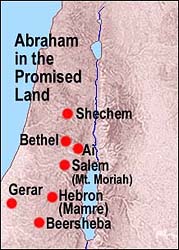 God had called him to go to the land of Canaan, but where should he stop?
God had called him to go to the land of Canaan, but where should he stop?
"Abram traveled through the land as far as the site of the great tree of Moreh at Shechem. At that time the Canaanites were in the land. The Lord appeared to Abram and said, 'To your offspring I will give this land.' So he built an altar there to the Lord, who had appeared to him." (12:6-7)
Abraham and his company kept travelling until they reached one of the few cities or settlements in Canaan at that time -- the city of Shechem. Outside the city was a large tree. "Tree" (NIV), "oak" (NRSV), or "plain" (KJV) in verse 6 is the Hebrew noun 'elôn, "terebinth, oak." The exact identification of the tree is disputed, (though the KJV translation "plain" is clearly a translation error). Trees figure several times in Abraham's travels: 12:6; 13:18; 14:13; and 18:1. Apparently certain such trees became so famous as landmarks that they were generally recognized by all as suitable for specifying rendezvous."[7] This particular tree (or grove of trees) was present for many generations, for we see it used by Jacob (Genesis 35:4), referred to by Moses (Deuteronomy 11:30), visited by Joshua (Joshua 24:26), and used as a coronation place during the time of the judges (Judges 9:6, 37).
Though the Canaanites sometimes used trees as a place of heathen worship (Deuteronomy 12:2; 1 Kings 14:23; Jeremiah 2:20; Hosea 4:13), there is no indication that Abraham's religious observance was like theirs -- though later he plants a tamarisk tree in Beer-sheba as an act of worship (Genesis 21:33).
The editor of this part of Genesis notes: "At that time the Canaanites were in the land." The term "Canaanites" here probably refers to Western Semitic peoples in general, since in 15:19-20 God's promise of the land includes a list of specific inhabitants: "Kenites, Kenizzites, Kadmonites, Hittites, Perizzites, Rephaites, Amorites, Canaanites, Girgashites and Jebusites."[8]
The Lord's Promise of Land (12:7)
But what makes the encampment at the Oak of Moreh so special is God himself:
"The Lord appeared to Abram and said, 'To your offspring I will give this land.' So he built an altar there to the Lord, who had appeared to him." (12:6-7)
In 12:1, God had revealed himself audibly to Abraham. Here he "appeared" to Abraham and spoke to him as well. "Appeared" is the Hebrew verb ra'eh, "see, look at, inspect," in the Niphal, "to be seen or to reveal oneself." [9] We aren't told exactly how God appeared to Abraham, but this "theophany" was probably some kind of temporary, visual phenomenon, perhaps the glory of God revealed. Jesus told his disciples that no one has ever "seen God" in the full sense (John 1:18; 1 John 4:12), but through a burning bush, a storm, an angel, a cloud, etc., God revealed himself to people. In each appearance, God reveals himself to offer a promise, command, or other important revelation.[10]
When God spoke to Abraham in Mesopotamia, he gave him a promise of greatness and blessing. But here he makes two promises:
- The land, and
- Offspring.
The land as yet is not carefully defined in God's promise, though it clearly includes the area in which Abraham is encamped.
But the word that Abraham is especially excited to hear is "offspring." Up until now Abraham had no real heir, except perhaps his nephew Lot or Eliezer of Damascus (Genesis 15:2). Now the Lord promises him "offspring" (NIV, NRSV) or "seed" (KJV). This is the Hebrew noun zērūa', "sowing, seed, offspring." It can refer both to the seed as semen and as the seed as offspring. Beginning with Genesis 3:15 "seed" is used as a singular, collective noun as "posterity" or "offspring," designating the whole line of descendents as a unit, "yet it is deliberately flexible enough to denote either one person who epitomizes the whole group (that is, the man of promise and ultimately Christ), or the many persons in that whole line of natural and/or spiritual descendents."[11]
In gratitude for God's promise and as an act of worship, Abraham builds an altar, and presumably, offers a sacrifice to the Lord.
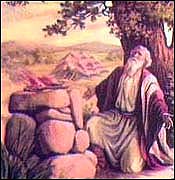 Abraham sacrificing at an altar. Unknown illustrator. |
At Bethel and the Negev (12:8-9)
We don't know how many years he spends in Shechem, but eventually this semi-nomadic shepherd moves on -- probably for the sake of the herds depending how much pasturage is available.
"From there he went on toward the hills east of Bethel and pitched his tent, with Bethel on the west and Ai on the east. There he built an altar to the Lord and called on the name of the Lord. Then Abram set out and continued toward the Negev." (12:8-9)
You can read more about Bethel, Ai, and the Negev in the Introduction. Abraham moves, but his worship of the Lord continues as he gradually travels south. Near Bethel "he built an altar to the Lord and called on the name of the Lord" (12:9).
Calling Upon the Name of the Lord (12:9)
What does it mean to "call on the name of the Lord"? The verb root is qr', "call out," denotes primarily "the enunciation of a specific a vocable or message." Here the verb qārā' connotes "calling one to a specific task" -- calling on the name of God, usually in the context of a critical or chronic need.[14] Abraham calls on the name of Yahweh in a new place. He recognizes his need, his loneliness, his need for guidance and direction. God has revealed himself to Abraham and now it is in Abraham's spirit to respond and seek him (4:26; 13:4; 21:33; Psalm 116:4, 17; Joel 2:32; Zephaniah 3:9).
To call on the name of God is to invoke God or ask for his help. On Mt. Carmel, Elijah lays out the rules for the contest between the true God Yahweh and Baal:
"Then you call on the name of your god, and I will call on the name of the LORD. The god who answers by fire--he is God." (1 Kings 18:24)
In our passage it is significant that Abraham is calling upon the name of Yahweh, not another god. The culture all around him was religious, calling on various supposed deities. But Abraham is now a believer in the One God -- Yahweh. He has cast his lot with him and now seeks him continually, openly, and boldly.
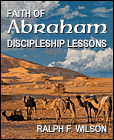 Available in PDF and Kindle formats. |
An earmark of a Christian disciple is one who continually calls on the name of the Lord Jesus, who is not ashamed of that Name. As Peter stood before throngs on the Day of Pentecost, he saw the fulfillment of Joel's prophecy and declared it boldly:
"'In the last days, God says,
I will pour out my Spirit on all people.
Your sons and daughters will prophesy,
your young men will see visions,
your old men will dream dreams.
Even on my servants, both men and women,
I will pour out my Spirit in those days,
and they will prophesy....
And everyone who calls
on the name of the Lord will be saved.'" (Acts 2:17-18, 21)
|
Q4. (12:9) What was the significance of Abraham "calling on the name of
Yahweh"? What does it mean for you to "call on the name of the Lord"?
|
Prayer
Father, help me to live with the bold, daring faith of Abraham. Show mercy on me that I might not settle down before I've reached the destination to which you have called me. Let me go when you want me to go -- and wherever you put me, whomever is around me, let me be unafraid to call upon the name the Lord. In Jesus' name, I pray. Amen.
Key Verses
"The Lord had said to Abram, 'Leave your country, your people and your father's household and go to the land I will show you.'" (Genesis 12:1)
References
Common Abbreviations https://www.jesuswalk.com/abraham/refs.htm
- Speiser, Genesis, pp. 91-93. Hurrians had established themselves as rulers of small kingdoms in northern Mesopotamia and Syria, such as Nuzi.
- Victor H. Matthews, "Family Relationships," DOTP 294, 298.
- "Said" is the Hebrew verb 'āmar, "say, speak, command, promise." Technically, this verb is in the imperfect tense with the wāw consecutive, used as the "narrative tense," describing a series of actions that take place after each other. (E. Kautzch and A.E. Cowley, Gesenius' Hebrew Grammar (Oxford: Clarendon Press, 1910) §111 (a)(1).) The translation "had said" (NIV, KJV) is possible but not required by the text. The NRSV's simple "said" is quite accurate.
- Leonard J. Coppes, TWOT #498.
- "Nation" is the Hebrew noun gôy, "nation, people ... The term gôy is used especially to refer to specifically defined political, ethnic or territorial groups of people without intending to ascribe a specific religious or moral connotation" (Gerard Van Groningen, TWOT #326e).
- John N. Oswalt, TWOT #285. "Curse" is the Hebrew verb 'ārar, "to curse," an antonym of "to bless" (Victor P. Hamilton, TWOT #168) On the basis of Akkadian arānu, "to snare, bind," the verb may mean "to bind (with a spell), hem in with obstacles, render powerless to resist."
- Herbert Wolf, TWOT #45i.
- More information can be found in Philip E. Satterthwaite and David W. Baker, "Nations of Canaan," DOTP 596-605.
- Robert D. Culver, TWOT #2095.
- Mark F. Rooker, "theophany," DOTP 859-864.
- Walter C. Kaiser, TWOT #582b.
- Herbert Wolf, TWOT #525b.
- L. Daniel Hawk, "altars," DOTP 33-37.
- Leonard J. Coppes, TWOT #2063.
Copyright © 2025, Ralph F. Wilson. <pastor![]() joyfulheart.com> All rights reserved. A single copy of this article is free. Do not put this on a website. See legal, copyright, and reprint information.
joyfulheart.com> All rights reserved. A single copy of this article is free. Do not put this on a website. See legal, copyright, and reprint information.
 |

|
In-depth Bible study books
You can purchase one of Dr. Wilson's complete Bible studies in PDF, Kindle, or paperback format -- currently 48 books in the JesusWalk Bible Study Series.
Old Testament
- Abraham, Faith of
- Jacob, Life of
- Moses the Reluctant Leader
- Joshua
- Gideon
- David, Life of
- Elijah
- Psalms
- Solomon
- Songs of Ascent (Psalms 120-134)
- Isaiah
- 28 Advent Scriptures (Messianic)
- Daniel
- Rebuild & Renew: Post-Exilic Books
Gospels
- Christmas Incarnation (Mt, Lk)
- Sermon on the Mount (Mt 5-7)
- Luke's Gospel
- John's Gospel
- Seven Last Words of Christ
- Parables
- Jesus and the Kingdom of God
- Resurrection and Easter Faith
- Apostle Peter
Acts
Pauline Epistles
- Romans 5-8 (Christ-Powered Life)
- 1 Corinthians
- 2 Corinthians
- Galatians
- Ephesians
- Philippians
- Colossians, Philemon
- 1 & 2 Thessalonians
- 1 &2 Timothy, Titus
General Epistles
Revelation
Topical

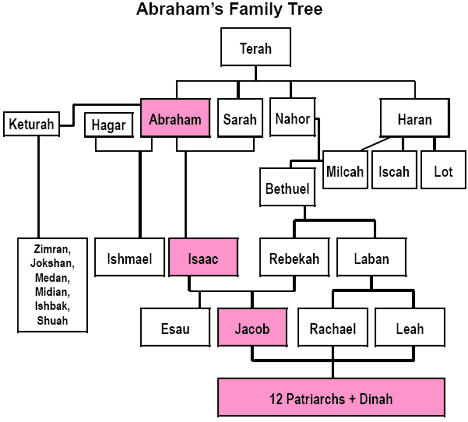
 To be notified about future articles, stories, and Bible studies, why don't you subscribe to our free newsletter, The Joyful Heart, by placing your e-mail address in the box below. We respect your
To be notified about future articles, stories, and Bible studies, why don't you subscribe to our free newsletter, The Joyful Heart, by placing your e-mail address in the box below. We respect your